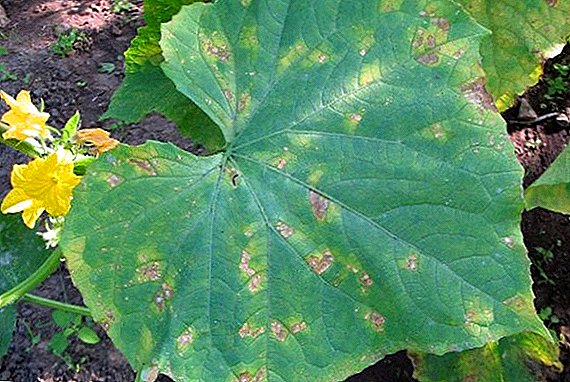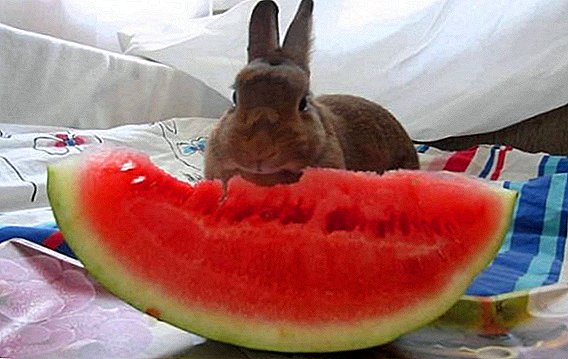 In the summer, rabbit owners actively replenish their diet with fruits and vegetables, both purchased and from their vegetable garden. Those who have a turret are considering feeding their pets with watermelons. We will find out whether it is possible to feed the rabbit with watermelon, how often and if there are any contraindications.
In the summer, rabbit owners actively replenish their diet with fruits and vegetables, both purchased and from their vegetable garden. Those who have a turret are considering feeding their pets with watermelons. We will find out whether it is possible to feed the rabbit with watermelon, how often and if there are any contraindications.
Is it possible to watermelon rabbits
Watermelons contain vitamins (E, C, PP, A, a group of vitamins B and carotenoids) and minerals (potassium, copper, etc.) that are necessary for the pet's body, so the owners of ears during the watermelon season do not miss the opportunity to treat their pets not only with the flesh of this sweet berry , but also crusts from the eaten watermelon.  However, we should not exclude the possible harm from the consumption of berries, because rabbits have a very weak and sensitive system of digestion.
However, we should not exclude the possible harm from the consumption of berries, because rabbits have a very weak and sensitive system of digestion.
Did you know? The fattest rabbit in the world, which is listed in the Guinness book, grew up in the UK. His name is Ralph, he reaches a length of 1.4 m, and weighs 25 kg. This rabbit belongs to the breed Continental Giant.
Pulp
The sweet pulp of watermelon contains nutrients, but it is too juicy, and such foods cause flatulence, which can very negatively affect the health of the rabbit.
Watermelon pulp is better not to include in the diet, and if given, in a very small amount, along with hay or other fibrous food, so as not to harm the digestion. In addition, the sweet juice stains the pet's face, attracting wasps and other insects to it.
Learn how to feed the rabbits correctly, including in the winter, and also see the list of allowed and prohibited foods for rabbits.
Corky
With crusts is a slightly different situation. They are less juicy and more fibrous, which means that the probability of the appearance of flatulence from them is less, besides, they do not stain the fur with sweet juice. However, they should not be abused.  If you want to feed the rabbit with watermelon, it is better to give him watermelon rinds with a very small layer of pulp.
If you want to feed the rabbit with watermelon, it is better to give him watermelon rinds with a very small layer of pulp.
Important! Improper storage of watermelon, abuse of fertilizers and toxic chemicals during cultivation will cause severe poisoning in the rabbit, which can end fatally. You can be sure only in watermelons grown independently. Most of all nitrates are concentrated in the peel of melon crops.
Feeding rules
Even a watermelon of excellent quality, grown on a bed and not containing harmful substances, should be given to a pet correctly.
At what age can and how to enter into the diet
Watermelon is forbidden to give the rabbit until he reaches the age of four months. You should start with a small piece and monitor its health - with the appearance of diarrhea or abdominal distension, the product is excluded from the diet. However, the rabbit may not want to have such an offering.
How to prepare and give
Watermelon peels should be prepared for feeding in the following way:
- wash well under running water;
- cut green hard skin;
- cut it into small pieces.

How often can
For rabbits, neither crusts, nor watermelon pulp should in any way be everyday food. They can be used only as an additive to the diet no more than 1-2 times a week.
Important! You can not feed animals rotten or sour crusts. This can disrupt the intestinal microflora and harm digestion, which is weak in rabbits.
At the same time, such feeding is not recommended to be given several times in a row, it is worth alternating with other fruits, for example, to give a watermelon in one week, and to treat animals with an apple or pear in the next one.
When it is impossible
The digestive system of rabbits hard processes juicy berries and fruits, so in some cases you can not give a delicacy.
Watermelon is contraindicated in rabbits in the following cases:
- intestinal disorders and diarrhea;
- bloating;
- infectious diseases;
- pregnancy and lactation. It is better to replace this berry with a carrot or an apple, but they should also be strictly rationed;
- little rabbits. Juicy feed to the rabbit begin to give no earlier than 2-2.5 months and start with apples or pears, and it is better to wait a little with watermelon.

Storage of watermelons in the cold season
Later varieties of watermelons can be stored in a dry and ventilated basement. The best preserved stout and seedless varieties. Under good storage conditions, they can remain fresh for about 3 months.
The best conditions for their storage are as follows:
- room temperature - + 6 ... +8 ° C;
- humidity - 80-85%;
- They can be decomposed into straw, buried in grain or smeared with clay;
- only intact fruits are stored;
- the presence of air circulation;
- regular inspection and turning of the fruit.
Find out whether it is possible to give nettle rabbits, wormwood, burdocks, Jerusalem artichoke, peas, beets, milk, grapes, cabbage, cherry branches, dill, pear.
It is best for the rabbits to feed on watermelon peels. Of course, fresh crusts are more useful, and eared birds love them more, but also dried ones can sometimes diversify their diet.
Between August and October, it is better to feed the animals with fresh crusts so that they can stock up on vitamins for the winter, but from December to early spring you can feed them with dried fruits.
Watermelon peel is dried as follows:
- wash watermelon under running water;
- cut into small pieces;
- clean the pulp;
- cut from the watermelon crust dark green layer from the outside;
- The remaining crust with a light green layer is carefully laid out on clean paper and dried. You can also dry in the oven on low heat or in an electric dryer.
 The crusts thus preserved in winter, as in the summer, are given little by little, like top dressing.
The crusts thus preserved in winter, as in the summer, are given little by little, like top dressing.What other melons can feed rabbits
In addition to watermelon, eared pets can be fed the following melon crops:
- pumpkin. It helps to improve digestion, increase growth, has a good effect on milk production in the rabbit, and also improves the quality of wool;
- zucchini. Promote better absorption of other foods. Usually give raw;
- squash. They have the same properties as zucchini;
- melon. You can give only a little bit, so as not to provoke intestinal diseases and bloating.
It is especially important to feed the rabbit with zucchini and pumpkin in the autumn, when the greens are gone, and these vegetables are still fresh. They contain many useful trace elements and vitamins. These gourds can be given raw and boiled.  When feeding these products recommend to adhere to the following rules:
When feeding these products recommend to adhere to the following rules:
- melons can be added to the diet of rabbits aged more than four months;
- if the vegetables are elderly and slightly outgrown, then the skin is cut from them and the seeds are removed;
- Zucchini or pumpkin themselves are not a delicacy for these animals. They prefer to use such products in bags. The flesh of vegetables is ground on a grater and mixed with corn silage. They can be given in boiled form with potatoes, beets and other vegetables;
- after cutting the melon (especially melon or watermelon), it should be stored for no more than a day in the refrigerator.
Did you know? Pumpkin seeds have excellent anthelmintic properties; therefore, they are also recommended to be added to food to rabbits as prevention against worms and other parasites.
If you decide to diversify the food of rabbits with watermelon, then it is better to stay on watermelon peels, they can even be prepared. It is necessary to use only good quality fruits (ripe, without nitrates and toxic chemicals, not rotten, fresh), in small quantities and not every day. In some cases, this juicy berry is better not to give.












